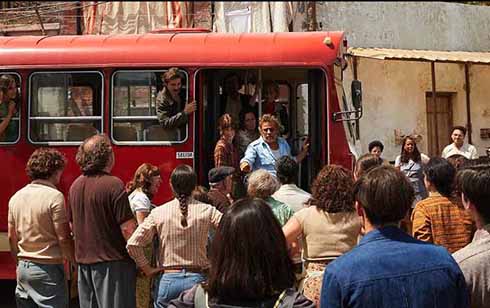'El 47' and 'Marco' star wins 2025 National Cinematography Award
El 47 tells the true story of a humble bus driver, who took a stand about the lack of services in his local area. So, he hijacked a bus and, in doing so, transformed the city of Barcelona for the better.
Marcel Barrena’s The 47, produced by The Mediapro Studio, tells the story of a working-class community in the hills of Barcelona and its struggle to get public transport and better living conditions.
 EL 47, Spain, 2024. Starring Eduard Fernandez, Clara Segura, Zoe Bonafonte. Directed by Marcel Barrena. In 10 minutes.
EL 47, Spain, 2024. Starring Eduard Fernandez, Clara Segura, Zoe Bonafonte. Directed by Marcel Barrena. In 10 minutes.
An intriguing title, suggesting some kind of hero with that name and number. In fact, the film is about a Spanish hero but the title refers to the number of the bus that he drives in the latter part of the film.
The film is set in two different periods – 1958, but mainly in 1978 just after Franco (who ruled for 40 years) dies.
In 1958, citizens from southern Spain had to move from their villages. They transferred to the outskirts of Barcelona, villages in the high and steep hills. They are impoverished, do not speak Catalan, and try to build some kind of community, especially houses, but are continually thwarted by a rule that if they house roof is not finished by morning everything is torn down by the rather gloating police. The citizens are finally enterprising, led by a strong character, Manolo played with strength and conviction by Fernandez.
Manolo is not a religious man, highly critical of a nun who has devoted herself to education and working for the poor. But, the social convictions combine with his fight for justice and she leaves the convent to marry him, work with him and raise his two children. With a range of characters and the interactions in the village, this is strong drama taking us back to difficult times.
While things have improved considerably in the village after 20 years, some stability in homes, education, the population is still comparatively impoverished many, having to work in the centre of the city that has no public transport. They walk down to the city but the walk home, up a steep hill, is especially difficult. Manolo is still a dominant character, somewhat mellowed over the years, and his wife, still devoted to him and to her work, especially teaching the poor.
There is a great deal of drama among the various characters in the town, especially on social issues and the facilities or lack of, poverty and personality clashes. With the issue of the steep hillside significant, Manolo decides to approach the authorities, patiently going to hearing after hearing, making his case for a bus to go up to the village. He is continually fobbed off. The climax of the film: clearly Manolo is going to drive that bus up the hillside, some of the path narrow, slippery soil, but, the final achievement, surrounded by the villagers.
A film about Spain and social justice but also a strong drama. It is the kind of film that makes us feel we have visited this village and know the people.
The Spanish Film Festival is led by El 47, a powerfully simple story about a local bus driver taking a stand against fascism and discrimination
El 47 is the most watched film in the Catalan language of the past 40 years across Spain. (Supplied: Spanish Film Festival)